Wish You Were Here
By Sophie Watson
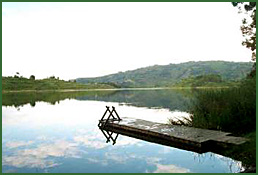
An eco-travel camp in Uganda proves that tourism can be good for the community as well as the visitor's soul. |
On this private patch of island in Africa, the view from the large green canvas tent is breathtaking: a lake of deep blue water framed by lushly flowered trees and swaying sorghum crops. Birds with names like Bou Bous, Robin-Chats and Weavers dart about, each speaking its own language.
Butterflies dance in the air, cats rustle in the foliage and spiders weave their webs on this 1.8-hectare island on Lake Bunyonyi in southwestern Uganda.
At Bushara Island Camp, you can start your day with breakfast at your tent or wake up by running the Eucalyptus trail a few times round the island. Later in the day you can take a birdwatching tour with Enosh - he'll give you a checklist that has hundreds of birds you might see or hear.
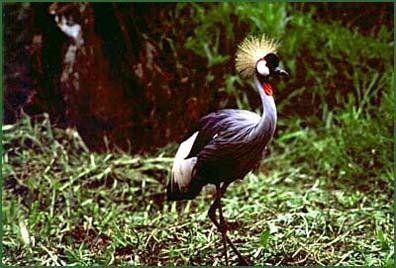
You can also take a tour of one of the nearby islands, visit a primary school, see some traditional dancers or just canoe for the thrill of the paddle.
Meals up at Swallows Restaurant include Crayfish Masala, Chicken Curry, Lemon Cinnamon scones and Banana Fritters topped with passion fruit. In the giftshop above the restaurant, you can choose from sarongs, baby rompers and ties in stunning African fabrics, or homemade baskets made from elephant grass and papyrus.
Of course, the views on vacations in the tropical Third World are supposed to be breathtaking, the food delicious, the atmosphere 'exotic.' That's what the brochures always say as they describe your 'vacation of a lifetime.'
But at Bushara Island Camp, an idyllic nature retreat for travelers in East Africa, there is both a view and a viewpoint.
Tourism can be good for the host community as well as the visitor's soul. It should create jobs so people don't have to leave their communities. And it should promote development in a way that conserves the environment - and local cultures.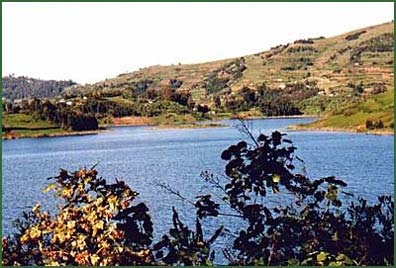
While at Bushara, you might not realize you are part of a community development project, although the dry pit-latrines, candlelight and solar energy probably give it away that you are at an ecotourism hotspot in Uganda, often called the 'pearl of Africa.'
When you pay the bill (reasonably priced, I should add) for your stay at Bushara Island, in addition to the camp's operations costs your money goes towards school fees, agroforestry projects and an orphan-care program. As a 'fair travel' operation, Bushara is a pioneer in Uganda.
And tourism has become vital to the local economy because the beautiful setting of Lake Bunyonyi is not sufficient to feed the community - home to roughly 47,000 people - beyond a point of subsistence farming. Soil erosion, over-farming and the decreasing size of land holdings are all barriers to a healthy standard of living.

Traditionally, in the Lake Bunyonyi area as in the rest of Uganda, agriculture is the most important sector of the economy, employing between 80 and 90 percent of the workforce. Women are responsible for up to 80 percent of the agricultural production, which involves both subsistence and cash crops.
Uganda's GNP per capita is U.S.$170 - the seventh lowest in the world. The average life expectancy is only 45.5 years. Stats like those spawned the creation of the Lake Bunyonyi Development Company (LBDC).
The Lake Bunyonyi Development Company was developed in partnership with the Church of Uganda, the Lake Bunyonyi community and the Africa Community Technical Service (ACTS), a Canadian Christian non-governmental organization (NGO). This coalition spent a good deal of time assessing the community's needs, and learned that the area desperately needed some kind of industry to create long-term jobs.
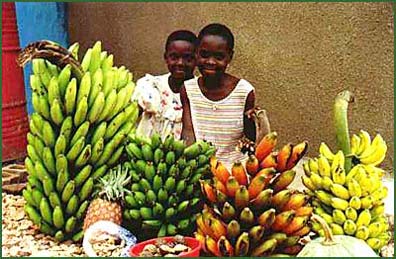
The people also needed immediate community development: orphan-care, better schools and an agroforestry program that would educate people about higher-yield farming techniques. But what could provide employment now and in the future? What would provide the money for community development?
One thing the area has always had going for it is sheer physical beauty. And Lake Bunyonyi is a rare swimmable lake - only two other lakes in Uganda do not have beaver fever and other dangers. So in 1992 the LBDC rented Bushara island from the Church and made it the region's first ever tourist facility.
The camp quickly found its niche: NGO workers looking for a break, missionaries looking for spiritual tranquility and big-time bird enthusiasts looking for the aforementioned Bou Bous and Robin-Chats.
In the beginning many of the staff were volunteers working for a meal a day. The company now provides jobs for 40 people, and revenue has grown from $27,000 in 1997 to $110,000 in 2001.
Bushara Island Camp has become the flagship for other camps in the area, and indeed for the whole country. There are now six other camps around the lake, each tailored to different clienteles, and a hotel is under construction.
The LBDC achieved success by tailoring projects to suit the environment and the community. Canadian involvement has come largely in the form of human investment. ACTS workers Tim and Joanne Specht arrived in Bushara in 1997. Their mission was to develop the camp, provide training to the staff and oversee local community projects.
After an assessment period, the Spechts and the staff focused on getting the camp up to tourist industry standards. Bushara added more menu items, safari tents and solar panels. Birdwatching and cultural tours were introduced, and new products were added to the giftshop. Staff were trained in customer service, market research and business development.
And a number of grassroots initiatives took root: a micro-credit loan plan, the Bunyonyi Wear sewing cooperative, an orphan-care program and an agroforestry education project.
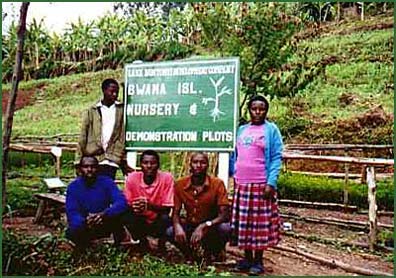
William Tibamwenda, from the Mukoni village on the mainland, has worked for the company since 1992. He started as a latrine digger and night watchman, but over the years has worked his way up to general manager. He had never before had the opportunity to use a phone, fax or email, nor had he ever travelled around his country.
Now he is in charge of all Bushara Camp operations.
When I sit down with William he has two things on the table: a handwritten stapled journal and a book on how to be a good manager. He is very proud of his company's history. He speaks of Tim and Joanne as being family, brothers and sisters in solidarity.
"This partnership between Ugandans and Canadians benefits the local people here," William tells me. "Before there was no development, no money, no education, no jobs, no agroforestry. This campground here is the mother of all campgrounds in the Kabale district. Others have copied us. The island was just used for cultivation before."
"The Canadians who first came here saw how poor the people were and wanted to create some revenue. Tim started the orphan-care program and expanded the agroforestry program. We have never failed to pay the wages or taxes, and we have never failed to buy what we need."
The LBDC is a leader in sustainable development on the lake. What makes this development company unique is that it is largely independent of foreign donors.
This for-profit business model is fueling the region's economic growth, and funding these community development projects:
Agroforestry
The hills around Lake Bunyonyi were losing their fertility due to over-farming and soil erosion, so the LBDC started an agroforestry program in 1994, training staff to carry out extension work. A tree nursery was set up on Bwama Island (directly opposite Bushara), with the Calliandra as the tree of choice due to its capacity to reduce soil erosion and replace nitrogen in the soil.
The LBDC provides local farmers with 60,000 trees a year through a seedling program. Farmers work in groups of four to six, each receiving 100 trees. Members of the group support each other in the planting and caring of the trees. Since its inception, the agroforestry program has aided hundreds of farmers around the lake.
Orphan-Care Program
In 1998 Benon Mugisha, an employee of the LBDC, died and was survived by his wife Loid and their two children Penelope and Peterson. These sad circumstances inspired an orphan-care program.
The community decided on a milling machine business to raise money for an orphanage. The LBDC provided the revenue for the capital costs of the machine and its installation, and the community built a structure to house it. They fired up the machine in August 2000, and the LBDC is now initiating similar orphan-care programs in other communities.
Bunyonyi Wear
Sarongs, dresses, hats, baby rompers and ties are some of the items sold at the camp giftshop. When you make a purchase, you receive a brochure explaining that Bunyonyi Wear comes from a cooperative of women who sew on foot treadle machines. They come from various villages around Lake Bunyonyi and have been chosen due to their inability to fulfill traditional roles within their families - roles that include heavy physical labour.
Each of these women has a health problem or disability, making them economic burdens to their families or labelling them as "unmarryable." Joanne Specht developed the cooperative with Maudah, William Tibamwenda's wife, when she could no longer work the family field.
The cooperative now trains women in sewing, style and pattern making. Joanne is also teaching the women bookkeeping and marketing so they can run their cooperative independently. The proceeds from tourists' purchases go directly back into the cooperative.
Crafts for Export: Fair Trade Products
In association with the Uganda Community Tourism Association (UCOTA), the LBDC started a program to teach the art of craft making. The LBDC coordinates the community project and UCOTA provides training in basket weaving, handmade paper products and other products. UCOTA then exports the products to local and international 'fair trade' markets.
Micro-Credit Program
Like many micro-credit programs worldwide, small groups of people who know and are willing to support each other apply collectively for loans. Each participant receives a share of these small loans to start or expand a micro-enterprise, and the LBDC provides training in business.
"It's very exciting," explains Tim Specht, "the micro-loans have a really significant impact. You're dealing with $100 for one person. They're allowed to pursue anything that involves trade - they can buy sorghum, sell it, buy chickens and sell eggs. The thing with ventures like buying sorghum in the harvest season and selling it in the high season is they can realize 60 - 80 percent on their investment. That has a substantial impact on the community if they can take $100 and get back $80."
Bushara Island Camp is just one small player in a huge international travel industry. Half of the people who holiday now do so in the Third World - in many countries tourism is a main source of money.
But while tourism does create employment, too often the jobs are in the low-wage service sector.
And much of the travel industry is based on the all-inclusive resort, walled off from the surrounding country while importing food and furniture. Owned by foreign companies, very little of the money spent by tourists is left behind in the host communities.
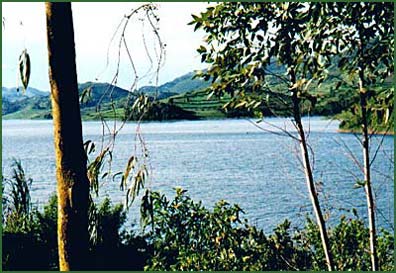
This sets Bushara Island Camp apart as a destination that's good for you, and good for them. The Lake Bunyonyi Development Company is not dependent on foreign donors, but on international solidarity and support. So if you are in East Africa on your way to see the mountain gorillas or just looking for a unique retreat, consider a visit to Bushara Island.
William Tibamwenda will be waiting with a torch to lead you to your tent and a cup of strong African tea. You can sleep in the clear African air content in the knowledge that your dollars will benefit both the local environment and community.
Sophie Watson is a Canadian freelance writer currently living in the U.K. This article was produced with the support of the Canadian International Development Agency (CIDA).
Written February 2003.
| Return to Top
|
| Articles Archive
| About Our Times |